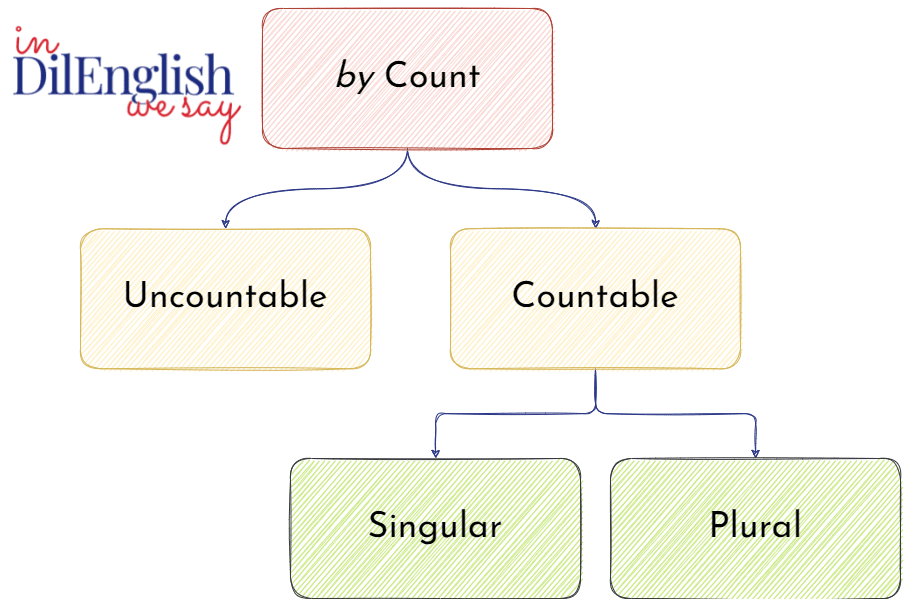Nouns may also be classified from the countability point of view. Nouns can be countable nouns and uncountable nouns.

Countable & Uncountable Nouns
Nouns may also be classified from another point of view: nouns denoting things (the word thing is used in a broad sense) that can be counted are called countable nouns; nouns denoting things that cannot be counted are called uncountable nouns.
Singular & Plural
English countable nouns have two numbers — the singular and the plural. The main types of plural forms of English nouns are as follows:
The general rule for forming the plural of English nouns is by adding the ending – s (-es) to the singular. If the noun ends in – s, – ss, – x, – sh, – ch, or – tch, the plural is formed by adding – es to the singular:
bus — buses
glass — glasses
box — boxes
brush — brushes
bench — benches
match — matches
If the noun ends in – y preceded by a consonant, у is changed into I before – es.
fly — flies
army — armies
lady — ladies
In proper names, however, the plural is formed by adding the ending – s to the singular:
Mary – Marys
day — days
play — plays
key — keys
monkey —monkeys
toy — toys
boy — boys
If the noun ends in – o preceded by a consonant, the plural is generally formed by adding – es. Only a few nouns ending in – o preceded by a consonant form the plural in – s.
cargo — cargoes;
hero — heroes;
potato — potatoes;
echo — echoes
All nouns ending in – o preceded by a vowel form the plural in – s and not in – es.
cuckoo — cuckoos
portfolio — portfolios
There are a few nouns ending in – o which form the plural both in – s and – es:
mosquito — mosquitos or mosquitoes
With certain nouns, the final voiceless consonants are changed into the corresponding voiced consonants when the noun takes the plural form.
The following nouns ending in – f (in some cases followed by a mute e) change into v (both in spelling and pronunciation) in the plural:
wife — wives
thief — thieves
knife — knives
calf — calves
life — lives
half — halves
sheaf — sheaves
shelf — shelves
leaf — leaves
wolf — wolves
There are some nouns ending in – f which have two forms in the plural:
scarf — scarfs or scarves
wharf — wharfs or wharves
Exceptions
1. There are seven nouns that form the plural by changing the root vowel:
| man — men | woman — women |
| tooth — teeth | goose — geese |
| louse — lice | mouse — mice |
| foot — feet |
2. There are two nouns that form the plural in – en:
| ox — oxen | child — children |
3. In some nouns the plural form does not differ from the singular:
deer, sheep, swine, fish, trout.
4. Some words borrowed from Latin or Greek keep their Latin or Greek plural forms e.g.:
phenomenon, phenomena; datum, data; crisis, crises; stimulus, stimuli; formula, formulae; index, indices.
Some of these nouns have acquired English plural forms:
memorandums, formulas, indexes, terminuses, etc.
The tendency to use the foreign plural is still strong in the technical language of science, but in fiction and colloquial English, there is an evident inclination to give to certain words the regular English plural forms in -s. Thus in some cases, two plural forms are preserved
formulae, formulas; antennae, antennas
5. In compound nouns the plural is formed in different ways. As a rule, a compound noun forms the plural by adding -s to the head word:
editor-in-chief — editors-in-chief
brother-in-law — brothers-in-law
looker-on — lookers-on
In some compound nouns the final element takes the plural form:
lady-bird — lady-birds
If there is no noun-stem in the compound, -s is added to the last element:
forget-me-not — forget-me-nots
merry-go-round — merry-go-rounds
Only Plurals
Some nouns have only the plural form but are sometimes singular in meaning though.
These are for the most part names of things that imply plurality or consist of two or more parts.
Trousers, spectacles, breeches, scissors, tongs, fetters.
Billiards, barracks, works. These nouns may be treated as singulars. We may say: a chemical works, a barracks, etc.
Words like phonetics, physics, politics, optics, etc. are usually treated as singulars except in some special cases.
It was not practical politics! (Galsworthy)
All party politics are top dressing. (Galsworthy)
The word news is treated as a singular.
When she goes to make little purchases, there is no news for her. (Thackeray)
The news he gave them was to be read in the lamentations. (Sabatini)
